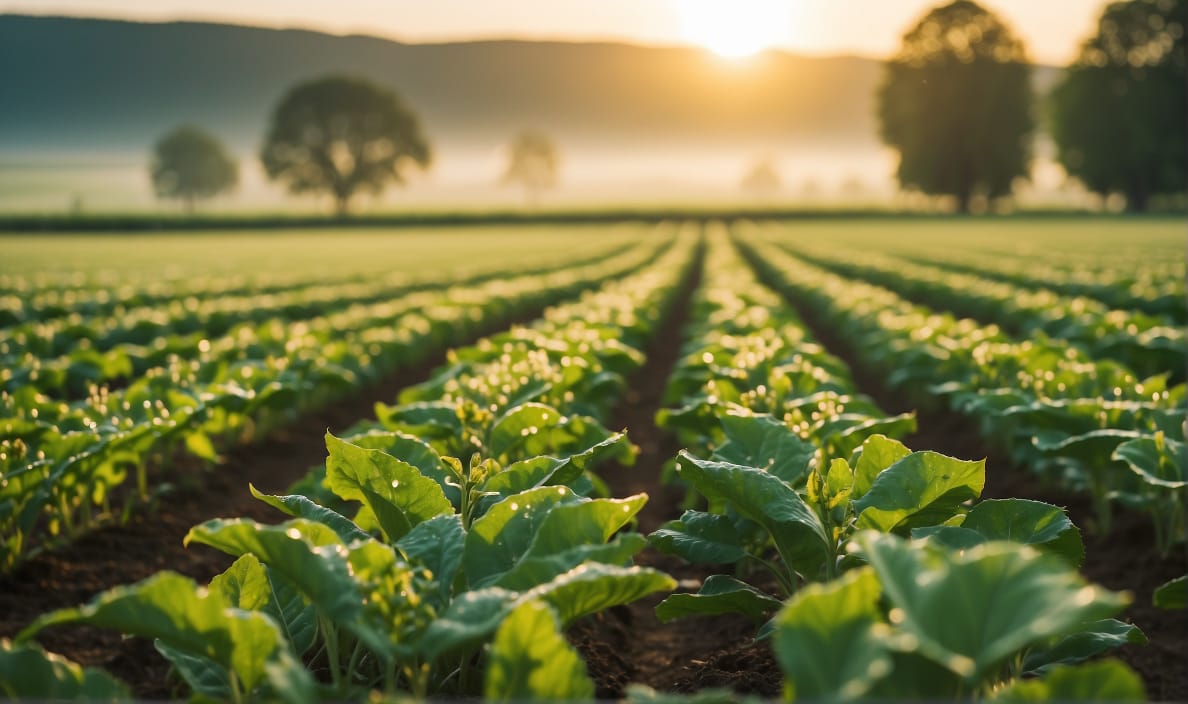Imagine a world where our food is grown not just with care for our health, but also with respect for our planet. That’s the heart of organic farming – a method of cultivation that’s all about keeping things natural. Now, let’s sprinkle a bit of modernity into this traditional picture. Enter technology, a game-changer that’s quietly revolutionizing how organic farms operate. It’s like giving superpowers to already superhero-like organic farmers!
Understanding Organic Farming
What is Organic Farming?
Organic farming is like the Earth’s playlist of its favorite tunes – natural, pure, and harmonious. It’s a farming method that steers clear of synthetic fertilizers and pesticides, relying instead on Mother Nature’s toolkit. Think compost, biological pest control, and crop rotation. It’s all about maintaining soil health, respecting natural life cycles, and keeping our environment as untouched as possible.
The Challenges of Going Organic
Now, organic farming isn’t a walk in the park. Farmers often face a trio of tough challenges:
- Pest Control: Without synthetic pesticides, organic farmers need to be nature’s ninjas, finding clever, natural ways to protect their crops.
- Soil Fertility: Keeping soil fertile naturally requires a masterful balancing act – it’s like being a chef, but for the soil.
- Yield Management: Organic farming usually means lower yields compared to conventional farming. It’s the trade-off for keeping things natural.
These challenges are real, but here’s where technology comes in, wearing its cape and ready to save the day!
Technological Innovations in Organic Farming
In the world of organic farming, technology isn’t just a buzzword; it’s a beacon of hope. Recent tech advancements are not just fancy gadgets but real problem-solvers. They’re shaping a future where organic farming isn’t just a niche but a norm, with higher yields and healthier produce.
Precision Agriculture
GPS and Sensor-Based Technologies
Remember playing video games with cheat codes? Precision agriculture is somewhat like that but for farming. It uses GPS and sensors to get a bird’s-eye view of the farm, down to each individual plant. These tools provide real-time data on soil conditions, plant health, and more, making farming less of a guessing game and more of a science.
Benefits in Organic Farming
In the organic world, where every drop of natural resource counts, precision agriculture is like a superhero. It helps farmers:
- Target Specific Areas: Instead of blanketing the whole field with water or natural fertilizers, farmers can pinpoint where it’s needed most.
- Monitor Plant Health: It’s like having a Fitbit for each plant, constantly monitoring its health and needs.
- Reduce Waste: With precise data, there’s less waste of water, natural fertilizers, and other resources.
Sustainable Water Management
Innovative Irrigation Systems
Water is precious, and in organic farming, it’s treated as such. Enter smart irrigation systems that use weather forecasts, soil conditions, and plant needs to determine when and how much to water. It’s like having a weatherman and a soil scientist working together to hydrate crops efficiently.
Impact on Organic Crops
These systems ensure that organic crops get just the right amount of water, leading to:
- Better Crop Health: Over or under-watering is a thing of the past.
- Conservation of Water: It’s not just about saving money; it’s about saving a vital resource.
- Optimized Growth Conditions: Perfectly watered soil means happier, healthier organic crops.
Soil Health Management
Technologies for Soil Testing and Analysis
Soil is the soul of organic farming, and technology is ensuring it stays healthy. With advanced soil testing and analysis tools, farmers can get a comprehensive view of their soil’s health, including nutrient levels, pH balance, and more. It’s like giving soil a regular health check-up.
Role in Maintaining Soil Fertility
Maintaining soil fertility in organic farms is crucial, and technology plays a pivotal role in:
- Identifying Deficiencies: Knowing what the soil lacks helps in choosing the right organic amendments.
- Monitoring Soil Health: Continuous monitoring means problems can be spotted and addressed early.
- Customized Soil Treatment: Each field gets exactly what it needs, no more, no less.
As we dig deeper into the role of technology in organic farming, we see a pattern of intelligent, efficient, and sustainable practices taking root. It’s a blend of age-old wisdom and cutting-edge technology, working hand-in-hand to feed the world in a way that’s kind to Mother Earth. Stay with us as we explore more about this fascinating fusion of tradition and technology in organic farming.
Biotechnology in Organic Farming
Biotechnology in organic farming is like walking a tightrope. It’s balancing between using cutting-edge science and sticking to natural farming principles. It’s a field bustling with potential and peppered with debates.
Understanding the Role of Biotechnology
Biotechnology is not just about modifying genes; it’s a broader science. It includes understanding plant diseases, breeding techniques, and even enhancing composting methods. In the realm of organic farming, biotechnology can play a role in improving crop resilience and fighting diseases – all within the framework of organic principles.
Debates and Ethical Considerations
The debate around biotechnology in organic farming is like a heated family dinner discussion. It’s complex and filled with strong opinions. On one side, there’s the promise of disease-resistant crops and higher yields. On the other, there are concerns about maintaining the natural integrity of organic farming. It’s a balance between innovation and tradition, with a hefty dose of ethical considerations.
Genetic Modification vs. Organic Principles
Exploring Boundaries and Compatibility
Genetic modification and organic farming often seem like oil and water – they don’t mix. Organic farming is about natural processes, while genetic modification is seen as a step too far from nature. However, the boundaries aren’t always clear-cut. For instance, traditional breeding techniques can also be seen as a form of genetic manipulation.
Public Perception and Regulatory Aspects
Public opinion on genetically modified (GM) foods in the context of organic farming is a spectrum. Some view any form of genetic intervention as taboo, while others are more open to techniques like marker-assisted selection, which doesn’t involve transgenic methods. Regulatory bodies often have strict guidelines defining what constitutes organic farming, and these usually exclude traditional GM crops.
Natural Pest Control
Biological Pest Control Methods
In the battle against pests, organic farmers are like nature’s warriors, using biological weapons instead of chemical ones. This includes introducing natural predators, using pheromones to disrupt pest mating patterns, and even employing beneficial microorganisms to outcompete harmful ones. It’s a sophisticated understanding of the ecosystem to control pests naturally.
Technological Tools for Managing Pests
Technology in pest management often looks like something out of a spy movie. Drones for surveillance, AI for predicting pest outbreaks, and even apps for identifying pest species. These tools help organic farmers stay one step ahead of pests, using information and precision rather than chemicals.
Data-Driven Farming
In the world of organic farming, embracing data is like unlocking a secret garden of insights. Big data and analytics are not just buzzwords; they are powerful tools reshaping how organic farms operate, leading to smarter decisions and sustainable practices.
The Role of Big Data and Analytics
Big data in organic farming is like having a crystal ball, but one that’s powered by data, not magic. It involves collecting massive amounts of information – from soil moisture levels to weather patterns – and analyzing them to make informed decisions. This approach helps farmers understand their land better, optimize resource use, and increase yield, all while staying true to organic principles.
Case Studies of Successful Data-Driven Organic Farms
Let’s take a virtual tour of some farms where data is the new fertilizer:
- Farm A: Here, sensors across the farm gather data on soil health, which is then analyzed to tailor organic fertilization methods precisely.
- Farm B: Utilizes weather data to plan planting and harvesting, significantly reducing crop losses due to unforeseen weather events.
These real-life examples show how data is not just about numbers but about tangible, positive changes on the ground.
Smart Farming Technologies
IoT in Agriculture
Imagine a farm where everything talks – no, not the plants and animals, but sensors and devices! The Internet of Things (IoT) in agriculture means a network of sensors and smart devices all communicating with each other. This network monitors everything from soil moisture to crop health, providing a wealth of data to make farming more efficient and productive.
Mobile Applications and Software
In today’s organic farming, smartphones are just as essential as tractors. There’s a plethora of apps and software designed for farm management. These tools help farmers track everything from planting schedules to organic certification processes, all from the palm of their hand.
Impact of AI and Machine Learning
Predictive Analytics for Crop Health
Artificial Intelligence (AI) and Machine Learning in organic farming are like having a super-smart farming assistant. Predictive analytics use past data to forecast future crop health issues, allowing farmers to take preventive measures. It’s about being proactive rather than reactive.
AI in Optimizing Operations
AI also plays a crucial role in streamlining farm operations. From optimizing irrigation schedules to predicting the best harvesting times, AI algorithms can analyze data in ways no human can. This leads to more efficient use of resources, higher yields, and a smaller ecological footprint.
Data-driven farming in the organic sector is a testament to how traditional farming practices can harmoniously blend with modern technology. It’s about making informed decisions that are good for the crops, the environment, and the farmers.
Challenges and Opportunities
In the journey of integrating technology with organic farming, the path is dotted with both hurdles and prospects. Let’s navigate through these:
Addressing Technological Barriers
The roadblocks in this journey are often about access and adaptation. Many organic farmers, especially in less developed areas, face challenges in accessing the latest technology. Then there’s the learning curve – adapting to new tech can be daunting. But where there’s a will, there’s a way. Training programs and government initiatives are slowly bridging these gaps, bringing tech to the fields in a more farmer-friendly way.
Future Prospects and Potential Growth Areas
The horizon is bright with possibilities:
- Precision Farming Expansion: As technology becomes more accessible, we can expect a wider adoption of precision farming techniques in organic agriculture.
- AI-Driven Solutions: With advancements in AI, there’s potential for smarter, more intuitive farming solutions tailored to organic practices.
Environmental and Economic Impact
Technology’s embrace in organic farming is not just about better crops; it’s about nurturing the planet and empowering farmers economically.
Assessing Environmental Benefits
The environmental wins are clear:
- Resource Efficiency: Technologies like smart irrigation and soil sensors lead to more efficient use of water and natural fertilizers.
- Reduced Carbon Footprint: By optimizing farm operations, technology helps in cutting down the carbon footprint of organic farming.
Economic Implications for Farmers and the Industry
Economically, the picture is promising:
- Increased Yields and Profitability: With better disease control and resource management, farmers can enjoy higher yields and profits.
- Market Expansion: Technology enables farmers to meet the growing demand for organic produce more efficiently, opening up new markets.
Conclusion
As we’ve journeyed through the role of technology in organic farming, it’s clear that this union is not just beneficial but essential for the future of sustainable agriculture.
Technology in organic farming is like a symphony where each note – be it data analytics, AI, or IoT – plays a crucial role. It enhances the efficiency, productivity, and sustainability of organic practices.
The Future Outlook
Looking ahead, the fusion of technology and organic farming holds immense promise:
- Sustainable Agriculture: This union is a key player in the global movement towards more sustainable agricultural practices.
- Feeding the Future: With a growing population and climate challenges, this synergy is pivotal in ensuring a food-secure future, where we nourish not just ourselves but also our planet.
In summary, technology in organic farming is a burgeoning field, ripe with opportunities for innovation, growth, and a more sustainable world. The future is green, and it’s smart!
Stay in touch to get more updates & alerts on Washington Greek! Thank you



